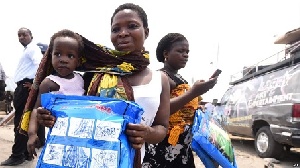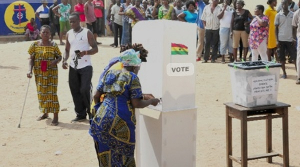Health News of Friday, 2 November 2018
Source: ghananewsagency.org
GHS to distribute free mosquito treated nets to households in Accra
The Greater Accra Regional Directorate of the Ghana Health Service (GHS) is to register households within the Region to pave way for the distribution of the long lasting insecticide treated nets (LLINs) aimed at eradicating malaria in the Region.
The registration exercise, which is scheduled for November 6 to 12, would be followed with the main distribution from November 22 to 28.
The use of the long lasting insecticide treated nets have been found to be cost effective approach towards reducing new cases and deaths due to malaria, health experts have indicated.
The distribution of the insecticides in the Greater Accra Region would therefore, mark the end of a nationwide Point Mass Distribution Campaign (PMD) that started by the GHS in February 2018, through which the GHS and its partners facilitate and implement a programme to distribute LLIN to the people of Ghana.
At a media briefing in Accra on Friday, Dr Charity Sarpong, the Greater Accra Regional Director of Health Services, said the best way to protect individuals and families from malaria was to encourage them to sleep under mosquito nets.
She said because mosquitoes that spread malaria bite rested indoors and had peak biting times between dawn and dusk, sleeping under the treated net was an effective way of preventing them.
Therefore, since 2003, the GHS had been promoting and distributing LLIN to many Ghanaians at various points through the hospitals, schools, antenatal and postnatal points, among others, to ensure that more people got to sleep under the nets, and were protected to help to reduce the malaria burden, Dr Sarpong said.
She said over the years, the GHS had embarked on several strategies that would help to address the high morbidities and mortalities caused by malaria and especially among the vulnerable groups in the society.
Dr Sarpong appealed to the media to partner the GHS, as a major stakeholder, to educate and inform the general public on the need to sleep under the LLIN and get registered in the upcoming point mass distribution to receive the free treated nets.
Mrs Dorothy Abudey, the Regional Malaria Focal Person, Greater Accra Region, said over two million LLIN’s which had been known to be important for malaria control would be distributed to all households in the Region.
She said during the registration exercise, each household head would be given a coupon card that would enable them go to the distribution points and take their nets with a code card.
She said based on the interventions such as LLIN’s and other point mass distribution that had been done over the years, the trend of malaria in the region had gone down drastically within the past four years.
“When you look at 2014, you will see that the malaria cases that reported at OPD in the Region was over 400,000+ then up to 2017, we are down to 342,000 and above. On the number of deaths, it is 31 in 2014 to six in 2017 for the under five-year-olds.
“On the deaths among the above fives too, it has reduced from 72 in 2014 to 14 in 2017. So you could see that the interventions that are being put in place are yielding results,” Mrs Abudey said.
She said under the registration programme, the GHS intended to register at least 90 per cent of all households in the region and it was expected that 90 per cent of the household would redeem their nets when the distribution starts.
She urged the public to cultivate and embrace the act of sleeping in the nets to benefit from the national programme.











